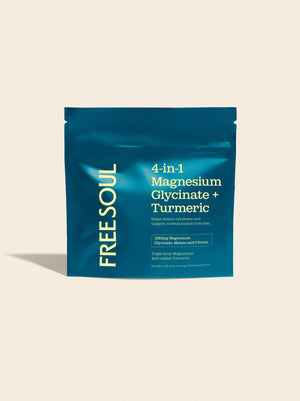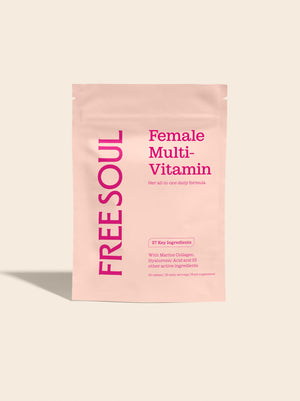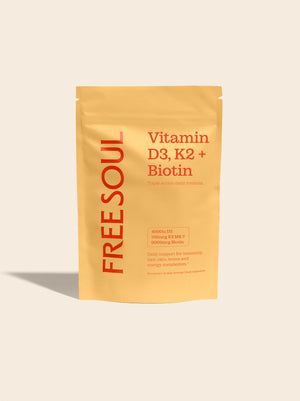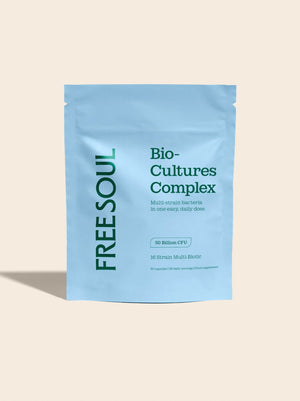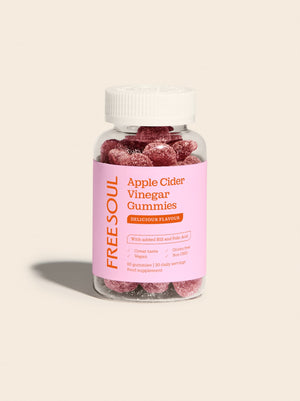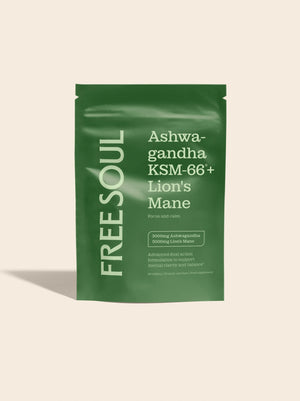Updated November 2025
One of the most common questions a nutritionist can be asked is: “What supplements should I take?”
And, whilst a healthy diet is always the best way to get the nutrients your body needs, there are some supplements and food blends that can be beneficial during each stage of life.
If you’re taking good care of yourself but still feeling fatigued or just not 100 percent, supplementation of certain vitamins and minerals could be what your body needs to thrive.
We spoke to Harriet Well and Free Soul Nutritionist Natalie Rouse, to break down the vitamins for women in their 20s that they often recommend to help you feel your best.
As Natalie says, “This is the decade for building bone strength, keeping your metabolism steady, renewing skin cells, protecting fertility, and learning how to manage stress. The choices you make now can influence everything from your mood and hormone health, to disease risk in later life.”
1. Calcium
Calcium is essential for females in their 20s as this is the time when bone density is still increasing.
Having enough calcium intake during this period can strengthen bones and reduce the risk of developing osteoporosis later in life.
You should aim to consume 1000 mg of calcium per day, and calcium supplementation can be a helpful option if your diet alone is not enough.
Calcium also plays a role in muscle function, nerve transmission, and blood clotting, so supplementation can also benefit physically active women or those with menstrual irregularities or heavy bleeding.
2. B-complex vitamins
B-complex vitamins are a group of water-soluble vitamins that play important roles in many bodily functions.
The B-complex vitamins include thiamin (B1), riboflavin (B2), niacin (B3), pantothenic acid (B5), pyridoxine (B6), biotin (B7), folic acid (B9), and cobalamin (B12).
These vitamins are involved in energy production, the metabolism of carbohydrates, proteins, and fats, and the maintenance of healthy skin, hair, and nails.
Many women in their 20s have diets low in certain B vitamins, particularly folate and vitamin B12, which can increase the risk of developing anaemia or birth defects during pregnancy. B-complex vitamins also play a role in mood regulation and cognitive function.
3. Vitamin D
Vitamin D is necessary for the absorption of calcium and phosphorus, which are essential minerals for bone growth and maintenance.
Vitamin D also plays a role in the immune system, helping to protect against infections and diseases.
Females in their 20s may be at risk of vitamin D deficiency if they have limited sun exposure or have a low vitamin D diet. Having a deficiency can lead to bone loss, muscle weakness, and an increased risk of chronic diseases.
The recommended daily intake of vitamin D for females aged 19-70 is 600-800 IU per day, but higher doses may be recommended for those who are at risk of deficiency.
Blood tests may be done to determine a woman's vitamin D status and the appropriate dose of supplementation.
It's important to note, vitamin D supplementation is recommended for everyone in the UK between October to March.
4. Magnesium
Magnesium is important for many bodily functions, including energy production, nerve function, and bone health.
It is involved in over 300 biochemical reactions in the body and also plays a role in the regulation of heart rhythm, blood pressure, and blood sugar levels.
Females in their 20s may be at risk of magnesium deficiency if they have a diet low in magnesium-rich foods or lose magnesium through sweating, such as during the summer months.
Supplementation can reduce tiredness and fatigue. The recommended daily intake of magnesium for females aged 19-30 is 310 mg per day.
It is important to note that excessive magnesium intake can lead to adverse effects such as diarrhoea and stomach cramps.
5. Iron
One of the most important vitamins for women in their 20s is iron. This is because women in their 20s who experience heavy menstrual bleeding or have a low-iron diet are at risk of iron deficiency anaemia.
Iron is necessary to produce haemoglobin, a protein in red blood cells that carries oxygen throughout the body.
Iron deficiency anaemia can cause fatigue, weakness, shortness of breath, dizziness, headaches, and pale skin.
Iron supplementation could prevent or treat iron deficiency anaemia, improving energy levels and overall health. Women should aim for 18 mg of iron per day, and a supplement may be necessary if they are not getting enough from their diet.
6. Protein
Increasing the amount of protein in your diet may be beneficial for all women, and meeting your body's requirements can be difficult through diet alone. Proper protein consumption is essential for supporting a robust immune system, hormone production, and the synthesis of enzymes and other essential molecules in the body.
Although many women can obtain sufficient protein through a healthy, well-balanced diet that comprises protein-rich sources such as lean meats, fish, poultry, beans, and dairy products, some may find it challenging to meet their protein needs.
Protein foods, such as the Free Soul Vegan Protein Blend, can provide a convenient and effective way for women to increase their protein intake.
Protein plays a key role in stabilising blood sugar levels by slowing down the digestion and absorption of carbohydrates.
When we consume carbohydrates alone, they are quickly broken down into glucose, leading to a rapid spike in blood sugar levels.
This spike is often followed by a subsequent crash, leaving us feeling tired and low in energy.
When we include protein in our meals or snacks however, it slows down the digestion process, resulting in a slower and more controlled release of glucose into the bloodstream. This helps to prevent rapid blood sugar spikes and subsequent crashes, providing a more sustained and steady release of energy throughout the day.
Summary
While a healthy diet is always the best way to get the nutrients your body needs, supplements & food blends can be helpful in filling any gaps and there are some supplements that can be beneficial during each stage of life. For women in their 20s, calcium, B-complex vitamins, vitamin D, magnesium, iron and protein are some foods & supplements that may be worth considering.











